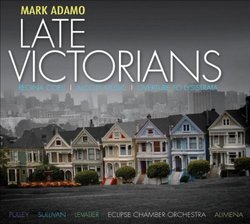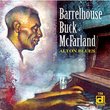| All Artists: Pulley, Sullivan, Levalier Title: Adamo: Late Victorians; Regina Coeli; Alcott Music; Overture to Lysistrata Members Wishing: 0 Total Copies: 0 Label: Naxos American Original Release Date: 1/1/2009 Re-Release Date: 11/17/2009 Genre: Classical Styles: Historical Periods, Modern, 20th, & 21st Century, Symphonies Number of Discs: 1 SwapaCD Credits: 1 UPCs: 636943925829, 636943925829 |
Search - Pulley, Sullivan, Levalier :: Adamo: Late Victorians; Regina Coeli; Alcott Music; Overture to Lysistrata
 | Pulley, Sullivan, Levalier Adamo: Late Victorians; Regina Coeli; Alcott Music; Overture to Lysistrata Genre: Classical Acclaimed as 'one of the — best opera composers of — the moment,' American — composer-librettist — Mark Adamo has also — ventured into symphonic — composition, in which his — theatrical sensitivity, political commitment and music... more » |
Larger Image |
CD DetailsSynopsis
Product Description Acclaimed as 'one of the best opera composers of the moment,' American composer-librettist Mark Adamo has also ventured into symphonic composition, in which his theatrical sensitivity, political commitment and musical mastery are equally evident. Late Victorians is dedicated both to the memory of the victims of AIDS, and to those who have survived. Similar CDs
|
CD ReviewsThe Beauty of Remembrance Tym S. | San Francisco, CA USA | 12/09/2009 (4 out of 5 stars) ""Late Victorians" is a great piece about a terrible thing. It is a sonic essay commemorating the losses of the AIDS plague in late 80's San Francisco. Composer Adamo evokes this in a theatrical collage of spoken word, operatic poetry, and bittersweet music. The narrative voice, based on Richard Rodriguez's essays, carries the tone of his spare, wise, sad clarity. Hardwon, wounded, a stark certainty come to from quiet, persistent, painful shifts. Stripped down to life and death, each moment becomes an epiphany, each memory a parting gift. Andrew Sullivan deftly narrates in harmony alongside soprano Emily Pulley, who instills melodic ease into unflinching lines from Emily Dickenson. Pulley in particular delivers a delicate balancing act of operatic beauty, witty phrasing, and topical modernity. "Regina Coeli", adapted from Adamo's "Four Angels" concerto, brings Mother Mary into heaven. The sad ascendence of the strings blossoms into gossamer wonder by harpist Dotian Levalier. "Overture to Lysistrata" compresses his "Lysistrata" opera into three movements: the dramatic first driven and restless, a tumbling wind through every corner; the second lyrical and passionate, romantic in the sense of idealism; and the third a complex tonal strobe running fiercely. From his world-famed "Little Women" opera, Adamo streamlines "Alcott Music" into three character movements for orchestral voicing. Rich in the personalities of their character namesakes, they are a joy to the ear. A fine overview of an important new composer." Dark, Beautiful, Amazing Ellen Davis | New York, NY | 01/08/2010 (5 out of 5 stars) "There's always such a sense of story in Adamo's music, even when there are no words involved. Regina Coeli, the luminous harp and strings piece, unfolds like a flower or a folk-tale: every note feels so right, even when you hear it the first time. I knew Little Women, and so enjoyed the suite, which sounds glamourous in this full-strings orchestration, but the Overture to Lysistrata was new to me, and sparkling: four joyous minutes of fizzing Champagne. The big piece, though, is Late Victorians, which is a kind of twenty-five solo opera in which the single character, remembering friends lost to AIDS, is played at once by a speaking man and a singing woman, while the friends he loses are evoked by instrumental soloists. Again, the story (not written, but assembled by Adamo from poetry of Emily Dickinson and prose of Richard Rodriguez) feels honest as your own diary, if you've ever lost someone to any tragedy at all: I can see a lot of people playing it late at night for solace. And what players! Andrew Sullivan is a grave, moving narrator, and Emily Pulley, the soprano, is a tender actress with a full, brilliant sound: I don't think I've ever heard a piannissimo like the clarinetist's in the first solo, and the hornist evokes memories of Dennis Brain. (Why aren't the players billed?) The conductor, Sylvia Alimena, makes every moment glow. A gorgeous, emotional record."
|





